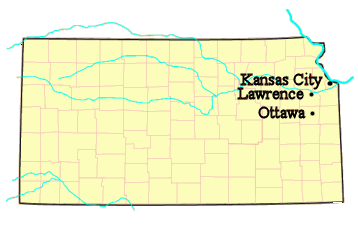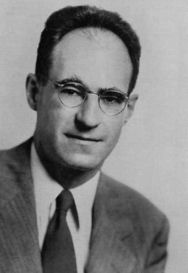|
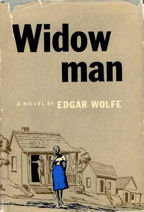
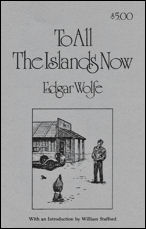

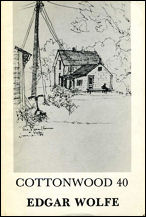
|
| Biography |
|
| |
Edgar Wolfe was born in Ottawa, Kansas on August 27, 1906. He attended the Univeristy of Kansas in Lawrence where he earned a B.A. in English. With his degree he taught high school in rural South Dakota. In 1929 he married Nina Ruth Winters. Wolfe eventually returned to Kansas where he worked as a teacher and a door-to-door salesman. In 1935 he quit work as a saleman and moved to Kansas City, Kansas where he worked as a caseworker for the Kansas Emergency Releif Commission.
He returned to the University of Kansas in 1947 where he earned his M.A. He would stay at the University of Kansas and teach creative writing, first as an associate professor and then as a professor. Wolfe published Widow Man in 1953 which was on the New York Herlad-Tribune's list of Best Books of 1953. He would go on to co-author and publish an English textbook, Write Now in 1954 as well as his novella, Trial By Ice in 1961.
Edgar lost his wife in 1973. He retired from the University of Kansas in 1977 and married Marguerite Everett that same year. In 1986, Edgar published a collection of stories and a narrative essay entitled To All the Islands Now and a special edition of Cottonwood magazine was dedicated to Wolfe that winter. Edgar Wolfe died in 1989, the same year a volume of his poetry, The Almond Tree, was published.
Return to Top of Page
|
|
|
Bibliography ( - housed in Thomas Fox Averill Kansas Studies Collection) - housed in Thomas Fox Averill Kansas Studies Collection) |
|
| |
Books:
 The Almond Tree (Woodley Press, 1989) The Almond Tree (Woodley Press, 1989) To All the Islands Now (Woodley Press,
1986) To All the Islands Now (Woodley Press,
1986) Window Man (novel) (Little Brown and Company,
1953) Window Man (novel) (Little Brown and Company,
1953)
Return to Top of Page |
|
|
| Selected Poems
|
|
| |
Each Man is an Island
To all the Islands
now I cry
My lesson in geography.
We are all, however close,
apart
and disparate, but yet alike,
being of the one great,
growing
Archipelago of Man,
which, crowding close, lies dense
in groups,
or else, much thinned, strung out for many
a
thousand miles across the reaches
of our sea, but still, alas, in
every
case, above the Primal Fault,
whose constant breakings,
tiltings, crackings
account for all these quakes we
have,
upheavals, tidal waves, and storms,
and even cause that
we must each
of us in time be taken down,
immersed and
drowned, while constantly
new islands are upheaved to
break,
in every season, every weather,
the astonished surface
of the sea.
South Wind
What birds are these that sing?
What wind
that climbs the hill and seems so glad
to find on it
the sun that she
will grant a dance to any tree,
a kiss to any
creature, however
old or gaunt and thin, whose love,
perhaps,
in autumn died, well-grieved
and long-bemoaned, under the
cold
stars or under the dim, gray sun
or snowy sky, but now he
wakes,
renews desire, sighs to the wind
soft words and begs
her to stay (her
of the warm Southland passing, who,
asked,
may choose to stay). But how can life
rise up again in
such a heart
as his? One with the grass the mystery
is, with
everything that's green,
with warmth and light and shadows
battening.
Above his head the pine song,
another in his heart,
of love
and life and all that comes with spring.
Return to Top of Page
|
|
| Original Jacket and Excerpts from
Widow Man |
| |
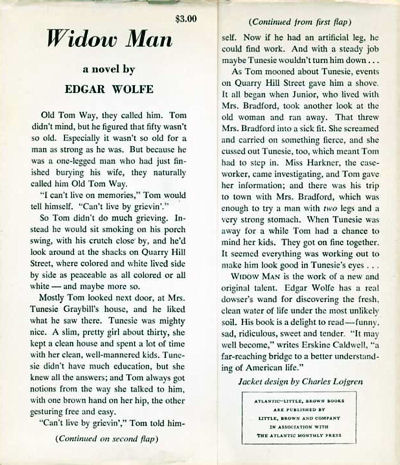
Chapter 2
"'Color don't really make no differ'nce in people. It's only what people thinks that does it. Take these folks here in this bus now. They'd look at Dioal an' me an' never could understand why we'd do it, or why she was better'n anybody else for me. They couldn't understand nothing. But when they look at me an' the old lady, maybe they do grab onto their noses an' breathe mighty scant an' set back there an' laugh their sleeves full, but here's the thing of it. There's some of 'em can put theirselves in our places just 'cause they thing we ain't all ways differ'nt. The color o' the package tell 'em the contents's the same. They think they could git old an' silly like her an' not git half looked after right. Or they could git a leg off like me an' then git sadled with an old crazy woman on top o' that. So they sorta see how it is. That's what bein' white is. It's bein' understood.'"
Chapter 3
This time he did not watch her go. He sat glowering, hurt an miserable and mean. He wanted to give pain and to receive it. If he could only, just once, plant a firm and improving kick on Mrs. Tunesie Graybill's all-too-fetching backside! Let her pay him back then all she liked. Let her snatch his cherished crutch and splinter it, for good and all, upon his useless old skull. It would help.
Nothing of her remained except the pie. It was her gift and it had pleased him, as she had. He leaped up, thinking to carry it to the garbage pail and hurl it savagely in, but his chair caught somehow and tipped over. Grabbing for it, he lost balance, fumbled his hold on his crutch, and sprawled headlong over the chair and down upon the fallen crutch and floor.
He was hurt and bruised, but now the realness of his pain seemed to cool his temper rather than make it worse. While he felt of his bruises and said the words that soothe, he was collectting his wits, and even as he hopped up on his foot again, retrieved his crutch, and righted the chair, he thought of something.
Why had Tunesie baked him a pie and washed his dishes? Becasue she was husband-hunting. Because he needed a wife. She had said that he did, and she had just been showing him her wifely accomplishments. Even in her effort to get him to spend his money on an artificial leg he could see her promoting him into that "steady wukin' man" whom seh coveted adn who didn't alwasy see her. If she married him, old cripple though he was, and, upon trial, he didn't satisfy, he imagined thathe white man could, like the two Negroes before him, become an ex-husband of Mrs. Tunesie.
Chapter 4
"'If I want to be white, really white, what I got to do is git out where I can be white --- leave Quarry Hill. Just sell out an' go, whether I want to or not. Live with white people, talk with'em, do things together, go to white churches, git acquainted---everything. Start all over'"
It was astonishing and appalling, too, but it was the thing to do. He seemed to see it clearly now. Leave the Hill! Leave his home. Leave Diola's home. Since she was dead, it was the thing to do. Leave the Ewings, the Johnsons, the Thompsons, all his old neighbors, everybody. Get away from Mrs. Bradford. Leave Tunesie. Then she would see.
Return to Top of Page
|
|
|
| A Poem for Edgar Wolfe
by Thomas Fox Averill |
|
| |
How to Grow Old Playing Handball, from Cottonwood Review 34, 1984
First, quit diving for the ball.
Let your aging
body teach you what your mind already knows:
A good player lets
the ball come to him.
When it does come, hit it well--
Every
shot must be the last.
Conserve what strength you have.
Get
used to going from tired to more tired.
Let your eyes learn the
slow burn of sweat.
Let your shoulers wince as your arms move in
that high arc above your head.
Let your kneeds stiffen
and
Stalk the ball in a crouch, neither straightening nor
stooping,
Compromised, but always at least half
ready.
Then quit playing singles. In doubles your partner can
take up your slack.
You won't see the ball as you once did.
It
will blur, then be there in your hand, a small black
surprise.
That fine spin,
That six-inch hop left or
right,
That calculated deadness from a corner shot,
That
crackling kill-shot off the back wall:
All of these will be
beyond your control as
The ball you've hit bounces straight from
the wall into
Younger, more certain hands.
When your
arthritic shoulders keep you from lifting your arms,
You will
look like a small bird, flapping your short reach furiously at your
sides.
When your neck is a stiff column,
You will rotate your
body with the slow precision of a periscope.
When your breath
comes short,
You will rest longer between games, between
points.
Play only three times a week, then twice, then once, then
sporadically.
Last, you will sit stiff in some chair.
Its
squeaks will always remind you of new tennis shoes on varnished
courts.
Your heart will thud like leather gloves striking that
small rubber ball.
The small of the court will live in your old
man's nostrils.
Return to Top of Page |
|
| An Edgar
Wolfe Chronology |
| |
1906--August 27, born Edgar Wolfe at 722 West
Sixth Street, Ottawa, Kansas.
1915--Moved to a
six-acre, "miniature farm" at 518 Beech Street,
Ottawa.
1924--Graduated from Ottawa High
School.
1924--Attended the University of Kansas,
Lawrence, Kansas, graduating in 1928 with a major in
English.
1928--Took a teaching job at
Stoneville, South Dakota, High School, teaching English, Latin,
Geometry and Bookkeeping.
1929--Married Nina
Ruth Winters
1930--Took a teaching position in
Axtell, Kansas.
1931--Took a teaching position
as the teacher at Weta, South Dakota, High
School.
1932--Returned to the University of
Kansas to begin work on a Master's degree in
English.
1933--Spring, won intramural singles
one-wall handball championship as a graduate student at the
University of Kansas.
1933--Summer, moved to
Ottawa to tlive with parents due to lack of
money.
1933--Fall, contracted to sell household
products for J.R. Watkins, Co., of Topeka, Kansas,
door-to-door.
1935--Quit sales, movedf rom
Topeka to the Argentine District of Kansas City, Kansas, and took a
job in Wyandotte Coutnry as a caseworker for the Kansas Emergency
Relief Commission.
1939--Reassignedto Rosedale
District. Ed's first purchased home was on Nearman Road, now 2220
North 55th Street.
1942--Left welfare work to
participate as he could in the war effort (poor eyes kept him from
enlisting) by teaching English and remedial work in the three R's to
courtmartialed prisoners at the U.S. disciplinary Barracks at Fort
Leavenworth, Kansas.
1947--Returned to the
University of Kansas with an assistant instructorship to again do
graduate work towards a Master's degree in
English.
1948--Won the Carruth Poetry
Prize.
1949--Won the William Allen White prize
for his novelette, I'd Shelter
Thee.
1949--Became a full-time Instructor
in the remedial English program, teaching 1-A
English.
1950--Finished Master of Arts degree in
English from the University of Kansas
1951--Won
the William Allen White Prize again, this time for the manuscript of
a novel, Widow Man.
1953--Published
Widow Man with Atlantic Monthly Press in conjunction with
Little, Brown and Company. Widow Man was listed on the New
York Herald-Tribune's prestigious list of Best Books of
1953.
1954--Wrote and published, as co-author
with A.C. Edwards and Natalie Calderwood, an English textbook,
Write Now (New York: Henry
Holt)
1958--Became Assistant Professor of
English.
1958--Ed's father died at age 82 in
Eudora, Kansas.
1961--Published a novelette,
Trial by Ice, in the anthology Kansas Renaissance,
ed. Warren Kliewer and Stanley
Solomon.
1963--Nina became bedridden with
multiple sclerosis, her fist symptoms appearing in 1938, her
condition worsening by 1958.
1963--Became
Associate Professor of English.
1969--Became
Professor of English.
1973--Nina died on
October4.
1977--Ed retired from the University
of Kansas English Department with Professor Emeritus
status.
1977--Ed married Marguerite
Everett.
1978--Marguerite's daughter, Ed's
stepdaughter, Mildred Everett Villot, was slain in a Kansas City
hotel, in a murder that was never
solved.
1982--Ed diagnosed with
lymphoma.
1986--Published To All the Islands
Now, two long stories and a narrative essay, with Woodley Press
of Topeka.
1989--George Edgar Wolfe died in
Kansas City, Kansas, on April 20. His ashes were scattered on Fox
Ridge, next to Nina's, by his good friend Roy
Gridley.
Return to Top of Page
|
|
| Primary Documents |
| |
"Tom Averill on Edgar Wolfe" article, January 1984
"Teaching Experience Plus" by Edgar Wolfe
"Telling Stories" article by Edgar Wolfe, January 1983
Letter from Edgar Wolfe about his book "To All the Islands Now", October 1985
Heartland Bookletter 2 article "Ed Wolfe at 80", Jan. - Feb. 1987
Return to Top of Page |
|
|
| Links |
|
| |
A page created by Robert Lawson, of Washburn
University, to review Wolfe's book To All the Islands
Now.
Ordering information for To All the Islands
Now, from Woodley Press.
Read Widow Man on the Center for Kansas Studies website.
Return to Top of Page |
|
| |

